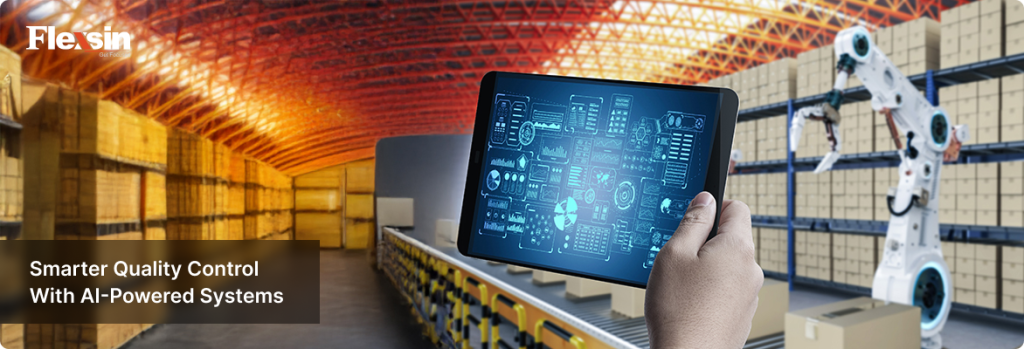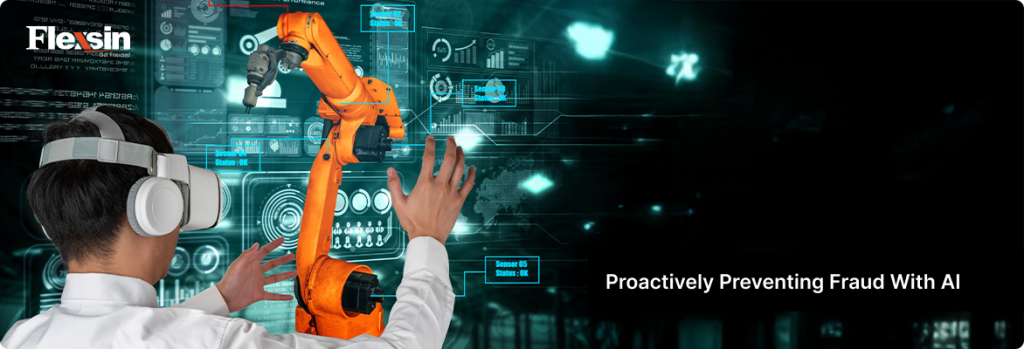In the fast-paced world of industrial manufacturing, ensuring consistent product quality is a constant challenge. Traditional quality control methods, while effective to an extent, often lack the speed, precision, and adaptability required to meet the demands of modern production lines. This is where AI quality control consulting services come into play. Businesses are increasingly turning to AI-driven solutions to tackle complex quality assurance challenges, from reducing human error to enhancing production efficiency.
However, implementing AI for quality control isn’t without its challenges. From the customization of AI models to seamless integration with existing systems, manufacturers face significant hurdles in realizing the full potential of AI-driven quality control.
In this blog post, we will dive deep into the practical aspects of AI quality control consulting services, focusing on specific challenges and how expert solutions can optimize industrial manufacturing processes.
1. Driving ROI with AI Quality Control
For many manufacturers, the idea of implementing AI in quality control can be daunting. The initial investment in AI systems, coupled with the complexity of the technology, often leads to hesitancy. However, the long-term benefits of AI far outweigh these initial hurdles. By employing AI quality control consulting services, businesses can gain clarity on the best AI solutions for their specific needs, ensuring smooth integration and maximizing ROI.
AI-powered quality control solutions help manufacturers reduce errors, streamline production processes, and lower operational costs by automating routine inspections. These systems can also analyze vast amounts of data in real-time, allowing for faster identification of defects and anomalies. As a result, businesses can improve overall product quality, reduce scrap rates, and avoid costly downtime due to quality-related issues.
Real-World Example:
A manufacturer of automotive components partnered with Flexsin Technologies to integrate AI-powered visual inspection systems. The solution reduced the time spent on manual inspections by 40%, while simultaneously improving the detection of defects that were previously overlooked, resulting in significant cost savings.
The Smart Way to Save Money and Increase Conversions
One of the most compelling reasons for adopting AI in quality control is its potential to drive substantial cost savings. Through AI quality control consulting, manufacturers can implement systems that identify inefficiencies in production processes and provide actionable insights for optimization.
AI-driven quality control systems can detect defects with unparalleled accuracy, minimizing waste and reducing the need for expensive rework or product recalls. Furthermore, the ability to predict potential failures before they occur enables businesses to perform predictive maintenance, thereby preventing costly repairs and unplanned downtimes.
By reducing operational costs and improving the consistency of product quality, AI applications integrations also have a direct impact on customer satisfaction and conversion rates. Customers are more likely to purchase products from brands that consistently deliver high-quality items, which ultimately boosts revenue.
Ensuring Long-Term Enterprise Success
As industries continue to evolve with Industry 4.0 technologies, AI is no longer a luxury-it’s a necessity. AI quality control consulting services offer essential advantages for businesses looking to scale and stay competitive in a fast-moving market. Here’s why:
Improved Efficiency: AI systems can process large datasets at high speeds, far surpassing human capabilities in identifying patterns and anomalies. This leads to faster decision-making and an optimized workflow across production lines.
Scalability: As your manufacturing operation grows, so does the complexity of managing quality control. AI solutions can easily scale to handle increased production volumes without compromising quality.
Competitive Advantage: Early adoption of AI in quality control sets businesses apart from competitors who are still relying on outdated manual processes. It ensures that products meet the highest standards, creating a significant competitive edge.
Real-World Example:
A large food processing company employed Flexsin Technologies for AI-driven quality assurance, which helped them scale operations while maintaining consistency across thousands of product batches. The implementation of AI quality control enabled them to improve their market share by ensuring reliable, top-quality products across all their distribution channels.
AI Quality Control Transformation
The manufacturing industry is rapidly embracing AI quality control solutions as a way to stay ahead in an increasingly competitive market. However, the path to successful AI adoption requires careful planning, customization, and integration. Flexsin Technologies offers expert AI quality control consulting services, helping businesses navigate the challenges of AI adoption and unlock the full potential of automated quality assurance.

2. Customizing AI Quality Control Solutions for Your Unique Business Needs
While AI technology offers significant potential in quality control, the key to success lies in customization. Every manufacturing process is unique, with specific requirements, product types, and quality standards. A one-size-fits-all approach often falls short of delivering the expected results.
AI quality control consulting services help businesses tailor AI models to their exact specifications. This involves adapting AI algorithms to handle industry-specific challenges, like varying product sizes, shapes, materials, and production speeds. With expert consultation, manufacturers can develop customized solutions that align perfectly with their operational needs.
The main hurdle in AI customization is ensuring that the system can learn and adapt to the diverse set of data it will encounter. For businesses to truly benefit from AI-driven quality control, the system must be trained on their existing production data, which requires expertise in data collection, preprocessing, and training model optimization.
Integrating AI Quality Control Systems with Existing Infrastructure
Another challenge that businesses face when adopting AI for quality control is integrating new AI systems with their existing infrastructure. Many manufacturers rely on legacy systems that aren’t built to work with cutting-edge AI technology. Successfully integrating AI quality control solutions requires seamless communication between AI-powered tools and existing machinery, sensors, and production systems.
AI quality control consulting services help businesses bridge the gap between legacy systems and new AI technologies by offering integration strategies that ensure a smooth transition without disrupting daily operations. This includes configuring AI models to interface with Industrial IoT solutions, upgrading outdated hardware, and aligning the AI’s processing power with the manufacturing facility’s bandwidth capabilities.
Achieving Scalable AI Solutions for Growing Businesses
As businesses grow, so do their production demands. A major advantage of AI quality control systems is their scalability. However, scaling AI solutions can be challenging, especially if the AI system was initially designed for smaller operations. Businesses need flexible AI models that can scale with their expanding needs without requiring a complete overhaul of the system.
AI quality control consulting services help businesses design scalable AI solutions that grow alongside them. By using cloud-based architectures, businesses can ensure that their AI systems can handle increasing data volumes and production complexities without sacrificing performance. Scalable AI solutions also enable manufacturers to add new production lines or adapt to new product types quickly.
Real-World Example:
A large textile manufacturer partnered with Flexsin Technologies to deploy an AI-powered visual inspection system that could scale with their expanding global operations. As they added new production facilities, the system was easily adapted to handle the increased production load, which helped the company maintain consistent quality across all facilities. The AI solution also automatically adjusted to different fabric types, reducing the need for manual recalibration.

3. Leveraging AI for Predictive Maintenance and Cost Savings
A significant benefit of implementing AI in quality control is its ability to enhance predictive maintenance capabilities. Rather than relying on scheduled maintenance, AI systems can analyze data from equipment sensors and predict when maintenance is required before a failure occurs. This helps manufacturers avoid unplanned downtime, which can be costly and disruptive.
AI quality control consulting services assist businesses in deploying AI models for predictive maintenance, analyzing real-time data to predict failures and optimize the timing of repairs. By adopting a predictive maintenance strategy, companies can significantly reduce equipment failures, extend the lifespan of machinery, and save on maintenance costs.
Streamlining Quality Assurance with AI-Driven Insights
AI models are incredibly powerful in terms of processing large datasets to derive actionable insights. When used in quality control, AI can sift through vast amounts of production data, flagging anomalies and providing real-time feedback on product quality. This level of data processing enables faster decision-making and allows businesses to maintain high-quality standards at scale.
AI quality control consulting services empower businesses to use AI-driven insights to continuously improve their quality assurance processes. By analyzing historical data, AI systems can recommend process adjustments and identify recurring issues, providing businesses with the information they need to optimize their operations for maximum quality and efficiency.
Enhancing Customer Satisfaction with Consistent Quality
One of the most significant benefits of adopting AI in quality control is the impact it has on customer satisfaction. In industries where customers expect the highest standards of product quality-such as electronics, pharmaceuticals, and food-consistency is key. AI systems can help businesses meet these demands by ensuring that every product leaving the production line is free from defects.
AI quality control consulting services help businesses develop systems that not only detect and fix quality issues but also predict and prevent them from occurring in the first place. This leads to more consistent product quality, fewer customer complaints, and a better brand reputation in the market.
Embrace AI Quality Control to Future-Proof Your Business
The integration of AI quality control consulting services into manufacturing processes is no longer a luxury-it’s a necessity for businesses aiming to stay competitive in a rapidly evolving industry. By leveraging customized AI solutions, businesses can overcome the challenges of customization, integration, and scalability, ensuring continuous improvement in product quality, cost efficiency, and operational performance.
If you are looking to optimize your manufacturing operations and stay ahead of the curve, now is the time to consider AI-powered quality control solutions. Flexsin Technologies offers expert consulting services that can help your business implement AI-driven quality control systems tailored to your unique needs.

4. Why AI Quality Control is the Key to Future-Proofing Manufacturing?
As manufacturers increasingly embrace Industry 4.0, AI quality control is emerging as a cornerstone of successful production strategies. The integration of artificial intelligence into quality control systems offers unmatched precision, efficiency, and adaptability. With the ability to continuously monitor and adjust production processes in real time, AI ensures that manufacturers are always ahead of the curve in maintaining top-quality standards.
The competitive advantage of AI in industrial manufacturing isn’t just about improving quality; it’s about creating a more agile, responsive operation. AI systems can quickly identify areas for improvement, streamline workflows, and predict potential quality issues before they arise, enabling businesses to pivot rapidly and address challenges before they impact production or customer satisfaction.
Clear ROI and Measurable Benefits for Manufacturing Operations
The ROI of AI quality control is clear-improved accuracy, reduced defects, minimized downtime, and better resource allocation all lead to substantial cost savings. As demonstrated in the earlier examples, AI solutions offer immediate benefits, such as:
Decreased Production Costs: By automating manual inspection and improving detection rates, manufacturers can significantly reduce waste and product recalls.
Improved Operational Efficiency: AI systems can process vast amounts of data in real-time, leading to quicker decision-making and faster issue resolution.
Increased Customer Satisfaction: Consistent, high-quality products foster customer loyalty, ensuring that businesses stay competitive in their respective markets.
The Strategic Role of AI Quality Control Consulting Services
As manufacturers look to stay competitive in a rapidly evolving industry, the need for AI quality control consulting services becomes even more critical. The complexity of adopting AI technologies, including system integration, customization, and scalability, requires specialized expertise. Flexsin Technologies provides the strategic guidance needed to ensure a seamless transition from traditional methods to AI-powered solutions, ensuring long-term success.
Through AI quality control consulting services, businesses can leverage cutting-edge technologies and methodologies to streamline their production processes, reduce costs, and improve overall efficiency. Flexsin’s team of experts works closely with manufacturers to understand their unique needs, providing bespoke solutions that directly address operational challenges and align with their business goals.
5. Transform Your Manufacturing Processes with AI Quality Control
The shift towards AI quality control in industrial manufacturing processes is no longer a futuristic concept-it’s happening now. Manufacturers who take advantage of AI’s capabilities today will be able to ensure better quality, lower costs, and more streamlined operations tomorrow. With the right guidance from AI quality control consulting services, businesses can overcome challenges such as system integration, customization, and scalability.
Flexsin integratesd AI-driven quality control systems to enhance precision, reduce defects, and optimize production lines for manufacturing leaders like Jamis Bikes, Daikin, and Sadirat.
Start your transformation today and unlock the full potential of AI-driven quality control for your manufacturing processes. Don’t fall behind the competition – contact Flexsin Technologies for a personalized consultation and take the first step toward revolutionizing your quality control strategies.


 Munesh Singh
Munesh Singh